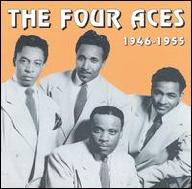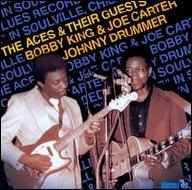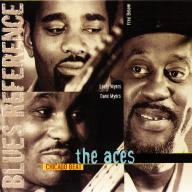But Little Walter couldn't have done it alone -- he needed accompanists who shared his desire to push the edge of the blues envelope, so he recruited his band from among the most accomplished and forward-thinking blues musicians available in Chicago. His first recording and touring band in 1952 was one that he'd sometimes sat in with while still with Waters -- The Aces, featuring brothers David and Louis Myers on guitars. The Myers brothers were born in Byhalia, MS, and had learned the rudiments of guitar from their father before the family relocated to Chicago in the early '40s while both brothers were still in their early teens. There their musical tastes were formed by equal doses of the big-band swing that was popular at the time, pop ballads they heard on the radio, and the blues that was being played all around their southside neighborhood. By the late '40s they had assumed the roles they'd play for much of their musical careers: older brother Dave providing basslines and chords into which Louis wove his tastefully jazzy blues riffing. Their rock-solid musical foundation provided the perfect base for the veteran bluesman they soon found themselves backing, but their musical precociousness drove them to eventually form the Aces, which incorporated some of the more modern and sophisticated influences that had raised eyebrows with the older blues crowd. The Aces were rounded out by schooled jazz drummer Fred Below, a Chicago native for whom the rough Southern blues rhythms were almost completely foreign; after his first gig with the group he was so musically disoriented that he decided to quit the band, but was persuaded to stick it out and adapt his jazz techniques to the blues, ultimately becoming the most in-demand blues drummer in Chicago (in addition to putting the beat to many of rock roll pioneer Chuck Berry's early hits). Little Walter approached his harmonica like a jazz saxophone player, and the Aces provided the propulsive backing of a swinging big band. It would have been near impossible at the time to find three musicians who were better suited to providing the solid foundation for Walter's musical innovations than the Aces, who had the musical and dynamic range, swing sensibilities, and melding of individual strengths that made them the standard by which all of Little Walter's later ensembles -- and most harp-led blues bands since -- have been measured.
Unfortunately this band was not to last; the Aces had been establishing their own name around town, but when their first records with Little Walter were released by the Chess Records subsidiary Checker as by "Little Walter and His Night Caps" or "...and His Jukes" (to capitalize on the popularity of his first hit Juke, recorded during a session while he was still with Waters), there was dissension in the ranks. The first to leave was Louis, who was replaced by Robert Jr. Lockwood in 1954. Almost 40 years old at the time, Lockwood's roots were in the Delta; as Robert Johnson's stepson, he had a firm handle on the deepest of blues, but had been studying jazz guitarists since at least the '30s, and had been recording since before WWII. He proved to be an adept foil for Walter's harp excursions, and many of Walter's jazziest adventures were supported and driven by Lockwood's sophisticated guitar riffing.
Dave Myers was the next to leave, joining his brother Louis in 1955 in a re-formed Aces that featured Junior Wells (who had played with them pre-Walter) and later Otis Rush. Dave was replaced by 19-year-old guitar prodigy Luther Tucker, who had been hanging around the band and occasionally sitting in with them, as well as with other local blues acts. Although Tucker's role was initially the same as Dave's -- thumping out basslines on his guitar and providing chordal fills behind Lockwood -- he soon distinguished himself as one of the flashiest of the new breed of guitarists in Chicago. When given the chance to take the lead, Tucker's fleet-fingered bursts of nervous energy helped push Little Walter's music in new and exciting directions. The first wave of rock roll was cresting, aggressively played electric guitar was moving to the forefront of popular music, and Luther Tucker was among the blues guitarists at the leading edge.
It was around this time that Fred Below vacated the drum seat, although as was the custom at Chess/Checker Records, he continued to be brought in for recording sessions for the next several years. Replacing him on the road for a time was his old drum school classmate Odie Payne, Jr., who had been playing and recording in Chicago since the late '40s with the likes of Tampa Red, Memphis Minnie, Memphis Slim and Elmore James, and later worked as the house drummer at Cobra Records, playing behind Buddy Guy, Magic Sam, Otis Rush and others. Payne's slightly more orthodox but still distinctly jazzy style was by all accounts ideally suited to Walter's music, although there's no documentation of him ever appearing on any of Walter's records.
After a short time with a still young and rambunctious Little Walter and the even younger Luther Tucker, Lockwood was began to tire of the grind, and he left Walter's band, although he continued to appear on records with him (and also notably with Sonny Boy Williamson) until the late '50s. In 1956 Jimmie Lee Robinson joined Little Walter's band, pushing Luther Tucker into the lead role that Lockwood had vacated. Robinson was another Chicago native, who had grown up around the blues-rich Maxwell Street Market area, and knew Walter from his escapades there during his earliest years in Chicago. Robinson's formative years included musical apprenticeship on Maxwell Street, followed by formal music lessons for a time, and then time spent with guitarists Freddie King, Elmore James, Eddie Taylor, and others in the early '50s. His guitar style had similarities to Tucker's, and eventually their roles carrying the top and bottom of the music melded to the point where they would trade back and forth even during songs. Unfortunately there are only a few examples of Jimmie Lee's years with Walter on record, due to the record label's insistence on not tampering with the successful studio formula that had been established by the Tucker/Lockwood/Below ensemble (usually augmented by Willie Dixon on string bass).
By the end of the '50s, Little Walter's hit-making days were behind him, and his bands soon became a revolving door through which a number of local musicians passed. In 1959 guitarist Freddie Robinson joined the band for a time (replacing Jimmie Lee Robinson, a move that has caused much confusion among discographers over the years), during which he sometimes played electric bass. Odie Payne left the band after a short time to be replaced by the solid if less musically adventurous George Hunter. During sessions over the next few years the drum throne (on sessions, at least) was also occupied by Billy Stepney, session ace Al Duncan, and even the return of Fred Below for a 1960 session. But blues tastes were changing, and his great ensembles of the past had all scattered and moved on to other pursuits with varying degrees of success. ~ Scott Dirks, Rovi







